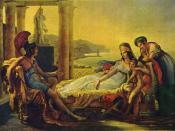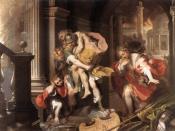In Virgil's The Aeneid, the main character, Aeneas, faces many obstacles and decisions that must be made in order for the New Kingdom of Rome to be successful. With these many life changing events, Aeneas becomes a man that he never wanted to be. Through this historic epic, we, being the reader, see drastic changes happening within Aeneas and his self-being. Virgil begins The Aeneid with Aeneas as the heroic figure of Troy who is forlorn and devastated when he is forced to leave his homeland after a tragic defeat against the Greeks. In this epic, it shows the hardships that Aeneas goes through in order to find a new home for himself and for his people. During the journey, he is sympathetic and loving to his people and the people they encounter but, when Aeneas becomes the "roman,"� he is no longer the hospitable Trojan he once was.
By the end of Virgil's epic, however, Aeneas is no longer a nostalgic and caring Trojan that he was in the beginning, but rather, he is a ruthless and powerful Roman, with his ambitions and tasks clearly known to benefit the success of his new homeland. This change was due to many things but one in particular. For Aeneas, leaving Troy was very difficult but the vision of founding Rome and the fame and glory that would go along with it drove him to this drastic change in the way he lived and essentially changed him into a completely different man.
Right after the fall of Troy, poor Aeneas is driven from Troy with nothing but his pride and his determination. Virgil stresses how well known and heroic Aeneas is time and time again, by saying things such as, "Who has not heard / of the people of Aeneas, of Troy City"� (Book 1, Line 767-768). He is constantly looked at as the heroic Trojan and the one who will essentially find a new home and life for all his people. We can see what kind of a leader Aeneas is just by the words Virgil uses to describe him, such as ""æfather Aeneas"� (Book 1, Line 788), and as a ""ædedicated man"� (Book 1, Line 411). Virgil shows deep respect for the character of Aeneas and shows what a good and worthy man he is by the terms of endearment he uses to describe the heroic Trojan captain. When Aeneas and his followers leave Troy, Virgil shows that Aeneas ""æwanders lost"æ"� (Book 1, Line 786), as if he is without himself since he left his homeland of Troy. Early on, we can easily see that Aeneas is very much attached to Troy and that at the beginning of his journey away from Troy, he is homesick and longs to go back to Troy. "Weeping, I drew away from our old country"� (Book 3, Line 14). Aeneas has such a great connection with his homeland, it is difficult for him to move on, even if it is at the gods decree that he must go and find Rome. Being so distraught about leaving Troy, Aeneas reluctantly draws away from his homeland and finds himself following the God's wishes out of loyalty and the hope that it will be better in the end. Being the gallant leader that Aeneas is, he leads the people away from the burned city of Troy to find a better life elsewhere. Even though we see that Aeneas would rather stay in Troy at this point in the story, his duties as a leader and as a follower of the gods, he leaves Troy with his head held high, however, he is not yet ready to let go of all the tradition sand memories of his beloved Troy. Aeneas is still sad about his departure from Troy in the land of Carthage. He tells Dido, after a plea from her, to stay with her, that if it were up to his ""æwishes, first of all / I should look after Troy and loved relics"� (Book 4, Line 471-472). He still has this connection with Troy and essentially is still Aeneas the Trojan, clutching onto all the Trojan principles and ethics as he embarks on his way to a new land.
We begin to see the other side of Aeneas as he departs from Carthage and Dido. He sees the smoke, and not knowing that it is his lover's funeral pyre, he fears that something has happened to her because he knew the hardships their love had caused her. Aeneas begins this transformation from a caring and dedicated leader to a ruthless man that sees only his needs and desires. In Book Five of Virgil's The Aeneid, Aeneas is rerouted to Sicily, the site where the Trojans had left for Italy a year earlier but had been driven off course to Carthage. This is the site of Aeneas' father's death. In memory of his father, Aeneas has his people plan a celebration in honor of Anchises. We see carefree games going on with Aeneas right in the middle of them. This is the beginning of the new Aeneas. Just days before, he was forlorn and distraught about the departure from Troy. Here, we see him in a gay and carefree mood, celebrating in Sicily. His attitude towards the games also shows the change in attitude. He takes pride in the events and the prizes. In Carthage, Aeneas had told Dido that he longed to go back to Troy, but here, in Sicily, he is no longer thinking of that, but rather he is thinking only about the festivities to celebrate his father. In this segment, we see his attitude shift to the thought of the fame of winning an event, or symbolic, for the fame of founding Rome and becoming the first Roman. He now begins looking forward to his new life and the new life for his people. "New generations called it Italy / after their leader. Our true home is there"� (Book 3, Line 231-232). He no longer looks at the past as something he wants to go back to, but actually, he looks forward to a new life that waits for him in the future.
The final obstacle that Aeneas faces is the journey into the underworld, where here is the place that Aeneas undergoes the final transformation into the Roman. However, he does not become the Roman that he father had wanted. He becomes ruthless and harsh, thus symbolizing that the Roman civilization will be a harsh one, and not be up to the moral code that Troy had once been. In the last words of Book six, Anchises tells Aeneas of the civilization he is to find. He says, "Roman, remember by your strength to rule / Earth's peoples "" for your arts are to be these: To pacify, to impose the rule of law, / To spare the conquered, battle down the proud"� (Book 6, Line 1151-1154). He wants his son to rule Rome with integrity and respect as Troy had. However, Aeneas does not fulfill his father's wishes, when Turnis is killed. Aeneas self transforms into a Roman, and will receive all the glory that comes with it, however, Aeneas became the man that his father had said not to. This was the price of the fame.
Some may argue that Aeneas' self-transformation was not fueled by his desire for fame and fortune but rather, for the sole reason of following the god's orders and by destiny that they decreed. "He came to Italy by destiny"� (Book 1, Line 3). Fame or no fame, Aeneas feared the gods and that is the reason that he left Troy and left Carthage to found the New Kingdom of Rome. There are many supporting incidences in The Aeneid which support this theory. "It is the Gods I fear / and Jove my enemy"� (Book 12, Line 1216). He fears what the god's might do if he doesn't follow their orders to leave Rome and to leave Carthage. Even in Carthage, when Aeneas has doubts about leaving Dido, the god Mercury, comes and tells Aeneas to leave during the night. Without even saying goodbye to Dido, Aeneas leaves Carthage, just because of what Mercury had told him to do. Contrary to this theory, however, there is much evidence that shows that Aeneas shows faith in the gods and does not fear them. Talking about the hardships his troops go through, he says, "God will grant us an end to these as well"� (Book 1, Line 273). Also, not only in Virgil's epic, but in Homer's as well, there are always hardships from the gods that the hero must overcome. Fear may be a factor of the reason that Aeneas was driven away from his homeland and the reason that he was transformed into the Roman he becomes in the end, however, it wasn't a major one.
To become a Roman, Aeneas suffered many hardships and troubles. His self-transformation cost him something much more valuable than just a lovesick affair. It cost him his moral being. The man he probably respected the most, and wanted the same respect from the most as well, his father, was lost in the pursuit of becoming Aeneas the Roman. From the beginning, he had kept the traditional Trojan morals and values but with one quick stab of the sword into Turnis, all that he had worked for and all that he had become, became all the things he had hated. In the end, Aeneas found Rome and became the first Roman, but had lost much more than he had gained.




